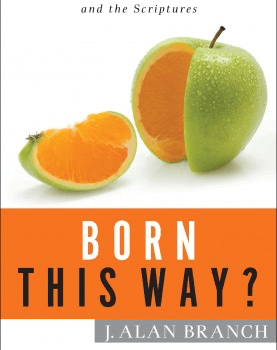Review: “Born This Way?” by J. Alan Branch
Over the past couple of decades, no facet of American society has experienced more upheaval than issues related to human sexuality. What was inconceivable less than a generation ago is now nearly complete in its social acceptance—the redefinition of marriage, gender and sexuality. For Christians, this is quintessentially calling good evil and evil good.
The drive to detach gender, sexuality and marriage from biblical and traditional categories of moral evaluation has been central to this transformation. For homosexual activists, asserting that one is “born gay” has been vital to their argument and has helped to galvanize broader public acceptance for the homosexual lifestyle and same-sex marriage. But are people “born gay?”
For most Christians, that question is a troubling. Confusion abounds, and the mounting cultural-pressure to accept the gay lifestyle makes the topic daunting. That is precisely why I am so thankful for Alan Branch’s new book, Born this Way? Branch serves as professor of Christian Ethics here at Midwestern Baptist Theological Seminary and as a research fellow in Christian Ethics for the Ethics and Religious Liberty Commission of the Southern Baptist Convention.
In Born this Way?, Branch engages the most recent scientific research, deconstructs the overreaches of the born-this-way movement, engages these matters from a robustly biblical worldview, and applies all of it in a pastorally-sensitive way.
First, Branch charts the history of the homosexual movement. These chapters provide rich background about how the homosexual rights movement, and the general drive for sexual liberation, took shape. For those unfamiliar with the homosexual movement, the first three chapters are worth the price of the book.
Branch introduces infamous figures like Sigmund Freud, Alfred Kinsey, and the specious aspects of their research. Additionally, Branch helpfully engages brain plasticity, and how new neuron paths form in the brain—in part due to human stimuli, like pornography. Additionally, he documents the successful political effort within the American Psychiatric Association to declassify homosexuality as a mental disorder.
In dealing specifically with the possibility of a “gay gene,” Branch argues:
What if some future study proves incontrovertibly that a specific gene or cluster of genes acts in such a way that every person with these markers is born with a homosexual orientation? Does this mean that we must then surrender Scripture teaching concerning the sinful nature of homosexual acts? No, we should not. One of the major flaws in born-this-way arguments is that advocates seem to want to affirm the basic idea of Genesis 1:26-28 (humans are made in the image of God), while rejecting the equally important fact of Genesis 3 (all humans have been negatively affected by a historic, space-time Fall). As a result, every human being is born with a natural tendency to rebel against God and sin. It is not inconsistent with Christian anthropology to suggest the effects of sin reach even to the level of how our genetic code influences the way we respond to certain stimuli and our desires be distorted.[1]
In Born this Way?, Branch is an honest broker, and throughout the book, he is appropriately nuanced. He engages the topic biblically, scientifically, sociologically, and pastorally.
Branch points out the spuriousness of born-this-way argumentation, but also deals honestly with the far-from-uniform results of reparative therapy and other ex-gay initiatives. Branch writes:
We must face the current data with honesty, but also with discernment. Movement on a continuum of orientation change is possible for some, but is not as easy or as frequent as many of us as evangelicals would wish….In this light, pastors and therapists should be cautious in assertions made to people struggling with same-sex attraction.[2]
Branch also engages the nomenclature itself, counseling,
“Christians do not hyphenate their identity: their identity is found in Christ alone….Our primary identity is not found in our sexuality; our primary identity is found in our redemption and relationship with Jesus Christ. When a person insists on calling himself a gay-Christian, he has made an idol of his sexual desires.”[3]
In summary, the presupposition of homosexual activists is that if a genetic causation for homosexuality is found, then the case is closed against biblical standards of sexuality, as well as the possibility of change. Many Christians buy this argument and categorically refute any scientific linkage to causation—or even correlation. On the other hand, they live in fear that if a linkage is found, then we will have no basis to label unbiblical sexual activity as sin. Genetic causation—or even correlation—appears to be the coup de grace.
Branch proves that the evidence for genetic causation of homosexuality is far from settled. And, in either case, Christians should not fear where scientific research might lead us. God’s Word, biblical theology, and the gospel of Jesus Christ give us sufficient ground to stand on—to articulate the Christian worldview, to offer hope to those mired in sexual sin, and to offer a clear and certain word to God’s goodness in marriage and human sexuality.
[1] 107.
[2] 132.
[3] 148-149.
topicsBook Reviews, Homosexuality

Comments are closed.